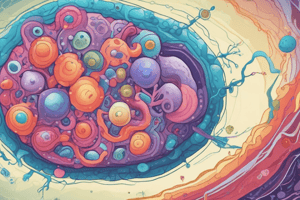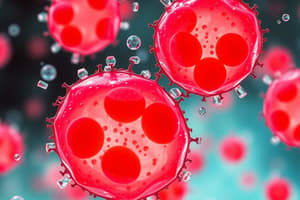Podcast
Questions and Answers
What is one of the key components of the cell theory?
What is one of the key components of the cell theory?
- All existing cells are made from other living cells (correct)
- Cells can spontaneously generate
- All cells increase in size over time
- All organisms are multicellular
Which of the following accurately describes prokaryotic cells?
Which of the following accurately describes prokaryotic cells?
- They have a nucleus and membrane-bound organelles
- They are the simplest and lack a nucleus (correct)
- They are multicellular organisms exclusively
- They are typically larger than eukaryotic cells
Which structure is unique to plant cells?
Which structure is unique to plant cells?
- Nucleus
- Ribosomes
- Cell wall (correct)
- Mitochondria
What is the primary function of ribosomes in a cell?
What is the primary function of ribosomes in a cell?
Which of the following organelles is involved in detoxification and lipid synthesis?
Which of the following organelles is involved in detoxification and lipid synthesis?
Which kingdom do eukaryotic cells belong to?
Which kingdom do eukaryotic cells belong to?
What is the role of lysosomes in a cell?
What is the role of lysosomes in a cell?
What distinguishes eukaryotic cells from prokaryotic cells?
What distinguishes eukaryotic cells from prokaryotic cells?
What role do centrioles play in animal cells?
What role do centrioles play in animal cells?
Which factors affect the diffusion of molecules across a membrane?
Which factors affect the diffusion of molecules across a membrane?
What is the main purpose of the cytoskeleton in a cell?
What is the main purpose of the cytoskeleton in a cell?
What distinguishes facilitated diffusion from simple diffusion?
What distinguishes facilitated diffusion from simple diffusion?
Which type of passive transport specifically involves water molecules?
Which type of passive transport specifically involves water molecules?
What mechanism is used by protein pumps during active transport?
What mechanism is used by protein pumps during active transport?
Which of the following best describes microfilaments?
Which of the following best describes microfilaments?
How do nonpolar molecules typically interact with the cell membrane?
How do nonpolar molecules typically interact with the cell membrane?
Flashcards
Cell Theory Parts
Cell Theory Parts
All organisms are made of cells, all cells come from other cells, and cells are the basic unit of life.
Prokaryotic Cell
Prokaryotic Cell
Simple, small cells without a nucleus or membrane-bound organelles; DNA is in the cytoplasm. (Bacteria, Archaea).
Eukaryotic Cell
Eukaryotic Cell
Complex cells with a nucleus and membrane-bound organelles; DNA in the nucleus. (Plants, Animals, Fungi, Protists).
Animal Cell vs Plant Cell
Animal Cell vs Plant Cell
Signup and view all the flashcards
Nucleus Function
Nucleus Function
Signup and view all the flashcards
Ribosomes Function
Ribosomes Function
Signup and view all the flashcards
Mitochondria Function
Mitochondria Function
Signup and view all the flashcards
Chloroplast Function
Chloroplast Function
Signup and view all the flashcards
Cytoplasm
Cytoplasm
Signup and view all the flashcards
Centrioles (animal cells)
Centrioles (animal cells)
Signup and view all the flashcards
Cytoskeleton
Cytoskeleton
Signup and view all the flashcards
Diffusion
Diffusion
Signup and view all the flashcards
Facilitated Diffusion
Facilitated Diffusion
Signup and view all the flashcards
Osmosis
Osmosis
Signup and view all the flashcards
Active Transport (Protein Pumps)
Active Transport (Protein Pumps)
Signup and view all the flashcards
Membrane Permeability
Membrane Permeability
Signup and view all the flashcards
Study Notes
Cell Theory
- All organisms are made of cells.
- All cells come from pre-existing cells.
- The cell is the smallest unit of life.
Prokaryotes vs. Eukaryotes
Prokaryotes
- Simplest, smallest, oldest cells.
- No nucleus or membrane-bound organelles.
- DNA located in the cytoplasm.
- Single-celled organisms (bacteria and archaea).
Eukaryotes
- Larger, more complex cells.
- Contain membrane-bound organelles and a nucleus.
- DNA stored in the nucleus.
- Single or multicellular organisms (plants, fungi, animals, protists).
Similarities
- Both have DNA as genetic material.
- Both have ribosomes and cytoplasm.
- Both have a plasma membrane.
Animal vs. Plant Cells
Similarities
- Both share most other cell structures.
Differences
- Animal cells have centrioles, plant cells do not.
- Plant cells have cell walls and chloroplasts, animal cells do not.
Cell Organelles
- Nucleus: Houses genetic material (DNA), produces ribosomes, controls gene regulation.
- Nucleolus: Produces ribosomal RNA, assembles ribosomes.
- Ribosomes: Synthesize proteins by translating mRNA into amino acids.
- Vacuole: Stores water, nutrients, and waste.
- Cell Wall: Plant cells only; provides support and protection.
- Cell Membrane: Controls what enters and exits the cell.
- Smooth ER: Detoxifies drugs/toxins, synthesizes lipids.
- Rough ER: Synthesizes, processes, and releases proteins (has ribosomes).
- Lysosomes: Recycles cellular debris using enzymes, digests food.
- Golgi Apparatus: Modifies, packages, stores, and transports materials.
- Mitochondria: Contains own DNA, produces ATP (energy) via cellular respiration.
- Chloroplast: Plant cells only; performs photosynthesis.
- Cytoplasm: Jelly-like substance filling the cell, supports organelles and enables reactions.
- Centrioles: Animal cells only; help organize cell division.
- Cytoskeleton: Provides structure, support, and movement/transport of materials.
- Microfilaments: Cell shape, movement (e.g., muscle contractions), and intracellular transport.
- Microtubules: Cell shape and support, cell division (chromosome separation).
Factors Affecting Diffusion
- Molecule Size: Smaller molecules diffuse faster.
- Temperature: Higher temperatures increase diffusion rate.
- Membrane Permeability: Membrane properties affect molecule passage.
- Polarity: Nonpolar molecules pass lipid bilayers more easily.
Passive Transport Types
- Diffusion: Movement of molecules from high to low concentration.
- Facilitated Diffusion: Movement with the aid of membrane proteins (channels).
- Osmosis: Specific diffusion of water through a selectively permeable membrane.
Active Transport Types
- Protein Pumps: Use ATP to pump molecules/ions across the membrane.
- Endocytosis: Membrane forms a vesicle to take in large particles.
Studying That Suits You
Use AI to generate personalized quizzes and flashcards to suit your learning preferences.




